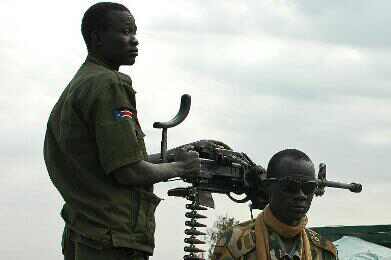South Sudan acquires more weapons amid rebel protests
July 15, 2014 (ADDIS ABABA) – South Sudanese rebels have protested against the recent acquisition of more weapons from China by the South Sudanese government, describing it as a preparation for more violence to further destroy the country.

South Sudanese defence minister Kuol Manyang Juuk has also confirmed to Bloomberg news agency the purchase of the weapons, which the China North Industries Group Corp., the nation’s biggest arms manufacturer known as NORINCO, shipped through Port Mombassa of Kenya last month.
“My role is to defend the nation,” Juuk said. “That means I have to arm my army. The army has to be equipped,” he said.
The rebels, however, accused the government of preparing for more war at the expense of the nation’s welfare.
“Well, our leadership sees this unfortunate development as a preparation for more violence by the regime,” Machar’s spokesperson, James Gatdet Dak, told Sudan Tribune when contacted on Tuesday to comment on how the leadership of the opposition group received the news.
“The regime has unfortunately prioritized hiring foreign mercenaries and acquiring weaponry to defend dictatorship at the expense of welfare of the citizens.”
“Instead of trying to correct their failures and deliver the badly needed basic services to the suffering South Sudanese people, the leadership in Juba is bent to further destroy the country,” he added.
Dak questioned the rationale behind the spending of hundreds of millions of US dollars more to acquire weapons and hiring and sustaining foreign army and mercenaries on an alleged deal which he said costs 3 million dollars a day “simply to fight against democratic political opponents while hundreds of citizens are dying every day because of hunger and curable diseases.”
“This is the reason why our leadership has always expressed the need to suspend the oil operations in South Sudan; or alternatively establish a special account through a trusted third party which should be inaccessible to the regime. This can deny president Salva Kiir’s government from using the oil revenues to finance the war,” he added.
He said the new development should serve as a reminder to the world that the government wanted to perpetuate the war.
BILLIONS SPENT ON WEAPONS
While humanitarian agencies appeal for 1.3 billion dollars for humanitarian intervention in the crisis, western diplomats have revealed that South Sudan government has already spent over a billion US dollars on weapons and delivery systems since the war broke out on 15 December 2013.
Ban Ki-moon, the United Nations secretary general warned in April of famine should fighting continue in the country.
The money mainly comes from the oil revenues and advance loans in a country which depends on oil by 98% of its annual budgets.
China is one of the biggest buyers of oil from South Sudan, output of which has fallen by a third to about 160,000 barrels a day since fighting between President Salva Kiir’s government and insurgents loyal to former Vice President Riek Machar started six months ago.
Chinese foreign ministry officials in Beijing have repeatedly called for peace and an end to hostilities. Chinese Ambassador to Ethiopia and the African Union, Xie Xiaoyan has worked with U.S., Norway and U.K. officials seeking to help resolve the conflict.
Protection of its oil investments and citizens is increasingly at the forefront of China’s interests in South Sudan.
China traditionally views its military ties with African governments to be in accordance with a policy of non-interference and respect for state sovereignty.
However, in the context of South Sudan, where atrocities have been committed by both sides of the conflict, this position may prove problematic for China — particularly as it continues to seek long-term peace and stability in South Sudan – and with US and EU imposing sanctions on the two warring parties.
South Sudanese defence minister Juuk explained his country preferred to buy weapons from China because Europe and the US don’t sell weapons to South Sudan.
“If they called me now to give me weapons I will go to America,” he said. “Please tell them, if they want me now I will go today,” he said.
The documents for the recent shipment of weapons by China included a detailed packing list of 9,574 automatic rifles, 2,394 grenade launchers, 4 million bullets for automatic rifles, 2 million rounds of pistol ammunition, 319 machine guns, 660 pistols, 20,000 rounds of 40-millimetre anti-personnel grenades and 4,000 rounds of 40-millimetre.
Another packing list, detailing goods worth $14.5 million, includes 100 anti-tank weapons systems, 1,200 anti-tank missiles and spare parts.
While marking the third anniversary of independence of South Sudan, rebel leader Riek Machar downplayed the significance of the sanctions imposed on the two warring parties by US and EU, saying an effective sanction would only come from the IGAD regional countries.
He said peace would speedily return to the young nation if Sudan and Kenya in particular took the courage to block oil flows and deny South Sudan access to the sea ports.
(ST)
